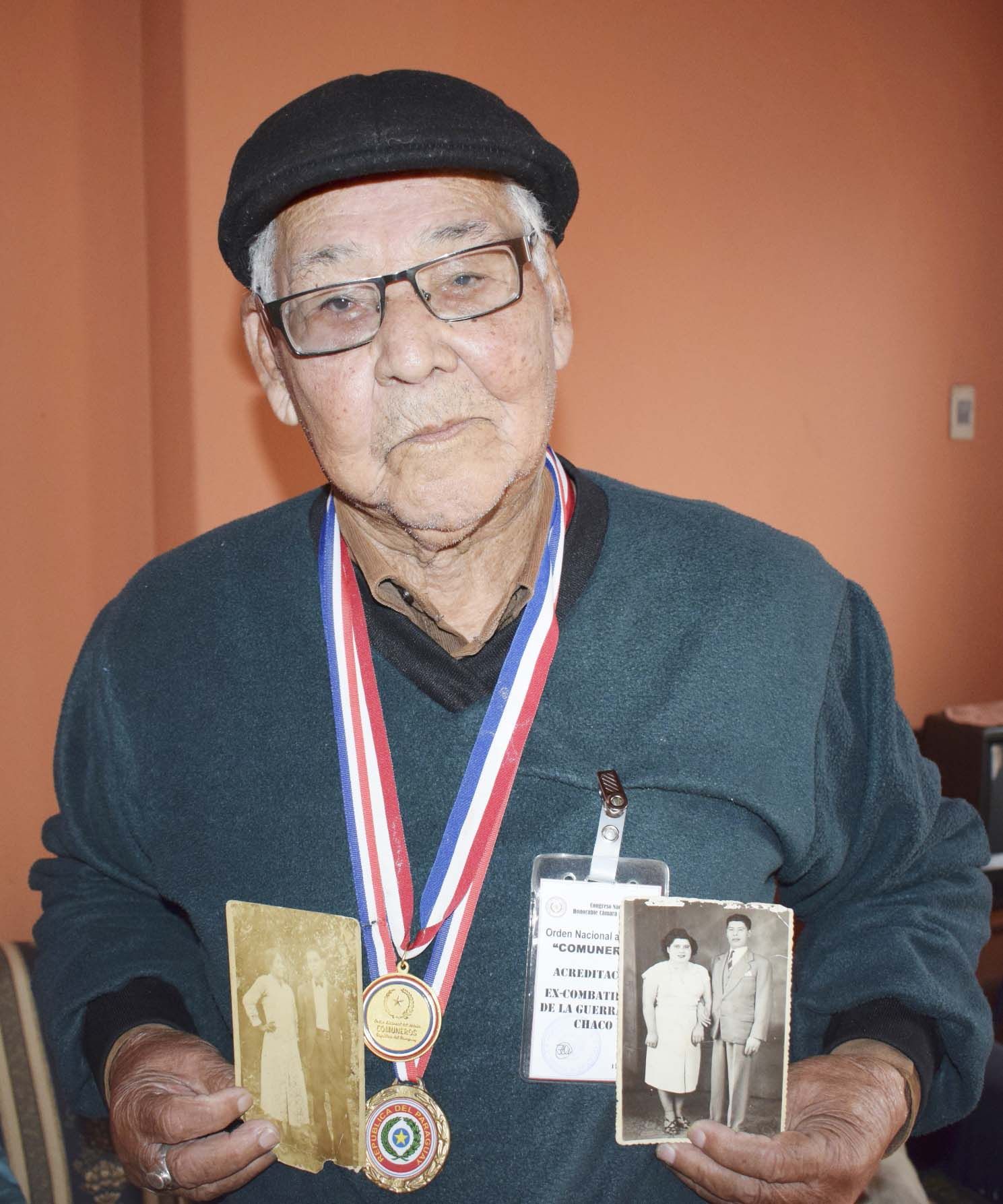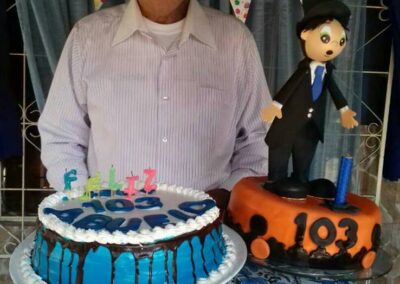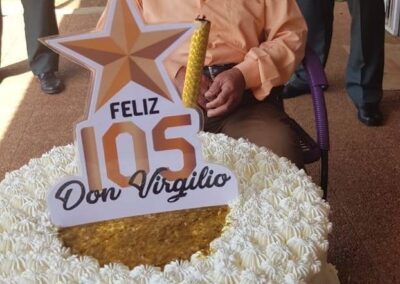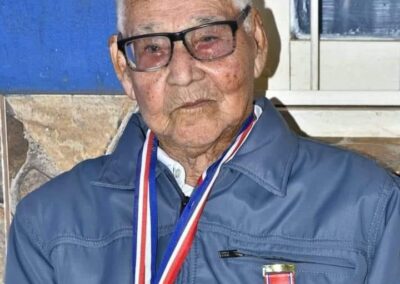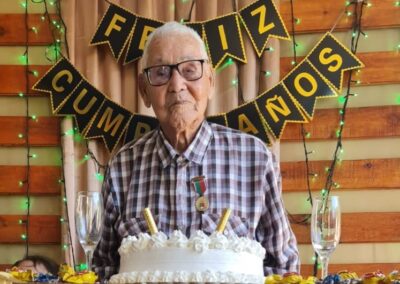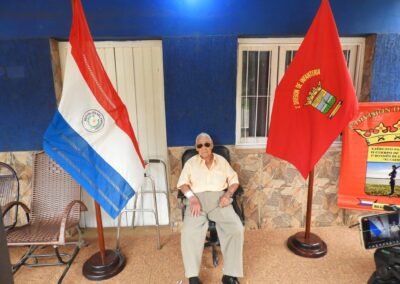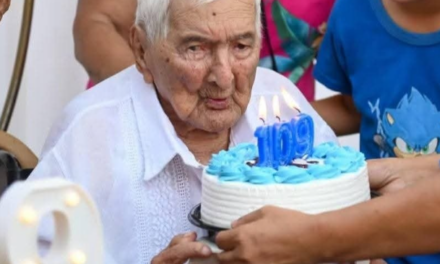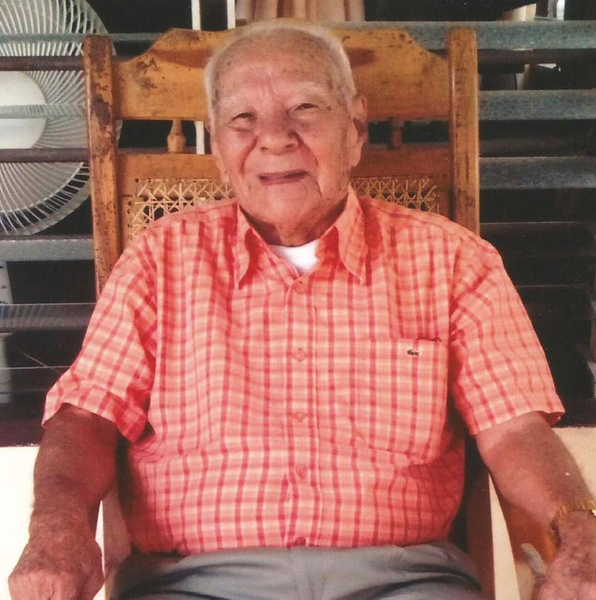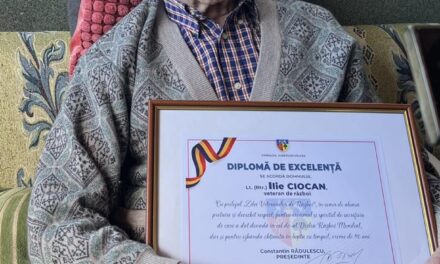Virgilio Dávalos Rey is a Paraguayan supercentenarian.
BIOGRAPHY
Virgilio Dávalos Rey was born in the rural town of Plácido, on the outskirts of Coronel Oviedo, Caaguazu Department, Paraguay, on 8 October 1914. He was the fourth of six children born to parents Remigio Dávalos and Lorenza Rey. He showed interest in reading, the arts, and culture from a very young age. After completing primary school, he was compelled to migrate from the town of Ajos to Villarrica, approximately 45 kilometers away. There, he settled with his two older brothers, Narciso and Máximo, who were both attending secondary school and working, just like Virgilio. He had to relocate because the first town lacked any secondary education institutions.
At an early age, during the Chaco War (1932–1935), he applied to serve as a soldier in the War Intendancy, where he was responsible for providing logistics for the front lines, including uniforms, ammunition, medicines, and weapons. He was later assigned to the Navy, where he sailed the Pilcomayo River to conduct inspections in the conflict-ridden region. Later, he served in the Infantry Regiment No. 10 “Sauce.” The regiment’s objective was to block the advance of the Bolivians toward Fort Alihuatá. In April 1935, while on the front lines, he fell ill and was unable to continue serving as a soldier, prompting him to return to the Military Hospital for a three-month rest. Due to the war, he lost the hearing in one ear, and his eyesight was also affected. Once he recovered, he was called to work in the military quartermaster’s office due to his self-taught skills in writing and calculations. After his recovery, he returned to his community of Plácido, where he was visited by his brother Narciso, also a combatant, who informed him that the war had ended.
At some point, he married Teresa Lopez de Davalos, with whom he had six daughters: Tomasa, Nimia, Francisca, Apolonia, Dominga, and Sara. After the war, he settled in his native Plácido, where he focused on trading local fruits, tobacco, petitgrain essence, and buying and selling cattle, among other activities. Over the years, he emerged as a community leader and successfully organized the community to build a primary school, which has provided education for over seven decades. Eventually, he acquired a property in the central neighborhood of Capitán Roa. As a prominent social worker, he was arrested several times by the police under the Stronista regime (1954–89) due to his liberal activism and social stance. At the age of 108, he had 10 grandchildren, 10 great-grandchildren, and 1 great-great-grandchild.
Despite all that was achieved during three years of war, he reflected on his experiences and expressed that he was never happy with what he had endured, describing the conflict as a painful “appendix” for all Paraguayans. He urged young people to understand the true meaning of war and its motivations, noting that he often sees them fighting for trivial reasons. He emphasized that battles should not be waged for insignificant matters.
On his 107th birthday, members of a reserve corps serenaded him with a band, playing marches and patriotic songs, as well as singing the traditional birthday song “Happy Birthday.” He was presented with a certificate of gratitude and recognition. Meanwhile, the governor of Caaguazú, Alejo Ríos Medina (PLRA), who also came to greet him, gifted him an Olimpia t-shirt, honoring the club of which he is a fan. In July 2024, the Chamber of Deputies decided to award him the National Order of Merit “Comuneros.”
RECOGNITION
His age has not been validated.
ATTRIBUTION
* “Excombatiente del Chaco recibió homenajes al cumplir 107 años en Coronel Oviedo” – La Nación, 8 October 2021
* “Excombatiente fue agasajado al cumplir 108 años” – La Nación, 9 October 2022
* “Guerra del Chaco: batallas de Boquerón y Nanawa fueron las más sangrientas, según excombatiente” – ABC Color, 11 June 2023
* “Don Virgilio Dávalos, último héroe viviente del Chaco en Coronel Oviedo” – OviedoPress, 12 June 2023
* “Diputados concederán orden nacional al mérito a excombatiente ovetense, don Virgilio Dávalos” – OviedoPress, 17 July 2024
* “Excombatiente de la Guerra del Chaco cumplió 110 años en Coronel Oviedo” – Prensa 5, 8 October 2024
GALLERY
Related Profiles
[crp limit=’4′ ]

